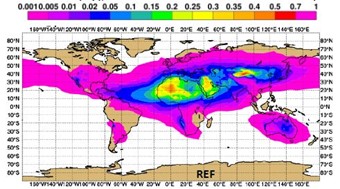The impact of high resolution modelling on mineral dust forecasts over West Africa using the ECMWF integrated forecast system
Supervisors: Dr Claire Ryder (University of Reading) , Dr Angela Benedetti (ECMWF), Professor Helen Dacre (UoR), Dr Guigma Kiswendsida (Red Cross Climate Centre, Burkina Faso), Dr Zak Kipling (ECMWF), Dr Samuel Rémy (Hygeos).
Dust storms are a major driver of poor air quality in many parts of the world, particularly in West Africa. Accurately forecasting dust storms remains a challenge in weather forecast models because many features which drive dust storms occur at smaller scales than are typically represented in forecast models. Currently, the ECMWF run a NWP model at 9km horizontal resolution, though dust uplift and transport are not predicted using forecast winds. However, wind-driven dust is included in the lower resolution (40km) ECMWF Copernicus Atmosphere Monitoring Service (CAMS) model. The timing and magnitude of dust storms can be inaccurate in the CAMS forecast due to poor representation of small scale wind features which pick up dust from the surface and transport it away from sources.
In this PhD, the successful student will add the representation of wind-driven dust to the 9km ECMWF NWP model. The student will assess the improvements in forecast dust as a result of higher model resolution, as well as the impacts on air quality across West Africa during extreme dust events.
The student will address the following research questions:
- By which processes, and to what extent, does increased model resolution improve the representation of extreme dust events?
- How is this related to improved representation of surface wind gusts, convective outflows, low level jets, diurnal cycles and surface source representation?
- How and why do factors such as column dust load, surface concentration, spatial structure, vertical distribution, size distribution and radiative effect of dust differ?
- Are health and socioeconomic impacts of dust storms better forecast, such as exceedance of air quality thresholds?
The studentship is co-sponsored by ECMWF via an internship placement, and receives additional CASE partnership funding from the Red Cross Climate Centre. If selected, the studentship will start in October 2022 and receive full funding (stipend and fees). Applications are open to UK and international students. The studentship will be part of the SCENARIO Doctoral Training Partnership. Application deadline: 21st January 2022.
Full project details: https://research.reading.ac.uk/scenario/wp-content/uploads/sites/121/2021/11/SC2022_29-RYDER.pdf
Application and details: https://research.reading.ac.uk/scenario/apply/
Please contact Claire Ryder (c.l.ryder@reading.ac.uk) if you have any questions.

